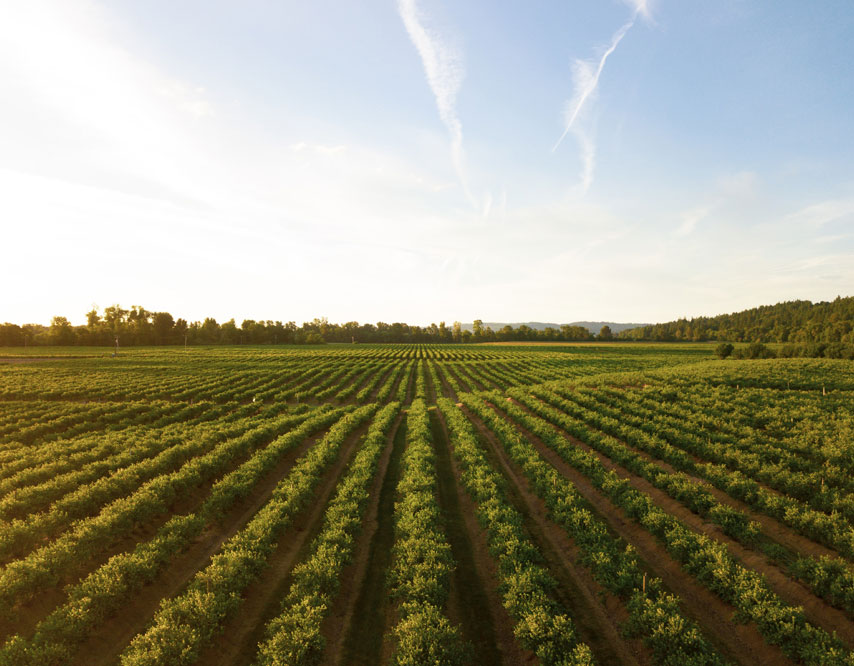-
Canopy Management
- » DF Pneumatic Leaf Remover
- » C-305 Independent Hydraulic Power Unit
- » CM-FF – Orchard Topper
- » CM-SF – Synchronized Bar Mower Topper
- » CM-SD – Synchronized Double Topping Machine
- » CM-SDT – Simple Synchronized Double Topping Machine
- » CM-SNU – Over-the-Row Topping Machine
- » CM-SNE – Electric and Hybrid Synchronized Topping Machine
- » CM-B – Basic Topping Machine
- » CM-SN New Model Synchronized Topping Machine
- » CM-S Synchronized Topping Machine
Ideal soil for vineyards: what are the most suitable soils?
On 17/04/2025
Comments Off on Ideal soil for vineyards: what are the most suitable soils?

Ideal soil for vines: what are the soils most suitable?
[ns_postMeta]

A vineyard profitable needs special terrain because the composition of the soil influence on the viticulture and wine quality.
The screw thrives in soils that are rich, indeed, gives the best of itself in the poorest. The same grape can give grapes with different characteristics depending on where it is grown: the roots of the plants absorb the water and nutrients that affect the character of the wine from the soil, the composition of which varies depending on the geological structure of the area.
In this article we will see what the ideal terrain for the vineyard and what are the soils most suitable for its cultivation, according to the different types of wine.
How to choose the ideal soil in the vineyard,
The soil is ideal for the vineyard must have certain characteristics. The main factors to keep under control are the drainage – the screw to be afraid of the stagnant for which the plant must not remain too long in contact with water – the texture and chemical composition.
THE TEXTURE
, The skeleton of the land is formed by a lattice of coarse particles, of diameter greater than 2 mm, which is then filled from the earth, the end (particles of diameter less than 2 mm). This is the weaving, also called grain size, that is, the percentage composition of sand, silt, and clay, materials with its quality, and particles of different diameter.
- Sand (0.02 to 2 mm): makes it more porous the soil, which becomes permeable and easy to work with. If present in excessive amounts can determine low fertility because it does not retain the water and the mineral salts, essential for the nutrition of the screws.
- Clay (less than 0.002 mm): it absorbs water to yield gradually to the roots and holds the substances concimanti. If it is too abundant, the clay makes the terrain waterproof, causing damage to the roots and to the micro-organisms that are useful to the plant.
- Silt (from 0.002 to 0.02 mm) has characteristics intermediate between sand and clay. Soils with too much silt are not suitable to the vineyard because they become difficult to manage.
From the point of view of agronomy, the soil is ideal for the vineyard, a balance between these three materials, with a clay content of which does not exceed 20-25%.
THE CHEMICAL COMPOSITION
OF THE the soil most suitable to the screw, contain limestone, marl, shale and clay.
- Limestone: it is formed in the result of the decomposition and mineralization of organisms with a shell or calcareous skeleton.
- Marne: are sedimentary rocks composed of one part of clay and one part of the carbonate can be calcium (calcite), or magnesium, and calcium (dolomite).
- Shale: are metamorphic rocks that are characterised by their ability to come apart into thin slabs. The shale, which originates from the clay subjected to high temperatures and pressures.
- Clay are very fine sediment consisting of aluminosilicate. Are formed from the leaching of rocks that contain these minerals following a long-distance transport in lake environments, marine or lagoon.
SOILS SUITABLE for DIFFERENT TYPES OF WINE
- calcareous-marly: the combination of limestone and clay gives the wine a deep color, intense aromas, structure, and low acidity.
- Calcareous-arenaceous: limestone and sand give life to wines, balanced by the fresh scent that does not love long ageing.
- Clayey soils they are more suitable for the cultivation of grapes; the wine will pigmentation and intense richness in alcohol and olfactory sensations complex.
- Sandy soils: large amount of sand to promote the wines with light structure, good acidity and low longevity.
What else to consider for the well-being of the vineyard?
Read the insights dedicated to the care of the vineyard, on the basis of the processing of your interest.
- Summer pruning: when and how to apply it for the benefit of your vineyards,
- Grass and between-row vineyard: the benefits and best solutions
- Shearing for vineyards: what to consider to achieve the best result?
- Shielding of the vineyard: dig in to this phase of processing
- Fixe vineyard: which stage of the manufacturing usa?
- Defogliatrice vineyard: discover the most suitable model for your reality
Conclusions
The screw does not need to soils that are particularly rich, but the most poor. In the world there are thousands of varieties of wine produced in the wine-growing areas very different from each other, which are located at different latitudes and altitudes: the ideal soil for the vineyard is not universal, but varies according to the screw, and the type of wine you want to produce. To choose the soil is most suitable, it is essential to know the drainage, the texture and the chemical composition of the soil.
BFM offers you the best machinery for the care and maintenance of the vineyard, from working the soil to pruning of the plantations. Contact us to know the most suitable solutions to your business!

